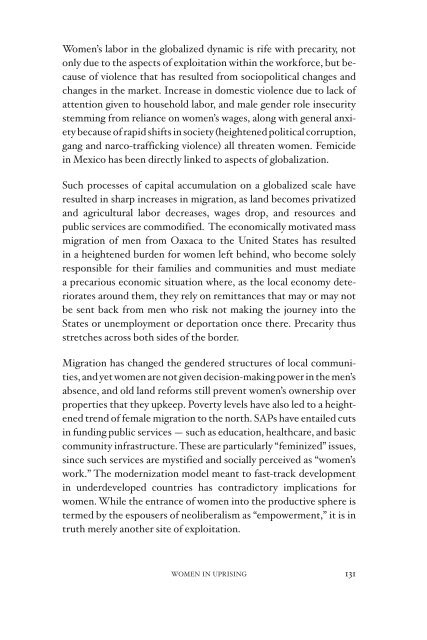Lies: A Journal of Materialist Feminism - Libcom
Lies: A Journal of Materialist Feminism - Libcom
Lies: A Journal of Materialist Feminism - Libcom
You also want an ePaper? Increase the reach of your titles
YUMPU automatically turns print PDFs into web optimized ePapers that Google loves.
Women’s labor in the globalized dynamic is rife with precarity, not<br />
only due to the aspects <strong>of</strong> exploitation within the workforce, but because<br />
<strong>of</strong> violence that has resulted from sociopolitical changes and<br />
changes in the market. Increase in domestic violence due to lack <strong>of</strong><br />
attention given to household labor, and male gender role insecurity<br />
stemming from reliance on women’s wages, along with general anxiety<br />
because <strong>of</strong> rapid shifts in society (heightened political corruption,<br />
gang and narco-trafficking violence) all threaten women. Femicide<br />
in Mexico has been directly linked to aspects <strong>of</strong> globalization.<br />
Such processes <strong>of</strong> capital accumulation on a globalized scale have<br />
resulted in sharp increases in migration, as land becomes privatized<br />
and agricultural labor decreases, wages drop, and resources and<br />
public services are commodified. The economically motivated mass<br />
migration <strong>of</strong> men from Oaxaca to the United States has resulted<br />
in a heightened burden for women left behind, who become solely<br />
responsible for their families and communities and must mediate<br />
a precarious economic situation where, as the local economy deteriorates<br />
around them, they rely on remittances that may or may not<br />
be sent back from men who risk not making the journey into the<br />
States or unemployment or deportation once there. Precarity thus<br />
stretches across both sides <strong>of</strong> the border.<br />
Migration has changed the gendered structures <strong>of</strong> local communities,<br />
and yet women are not given decision-making power in the men’s<br />
absence, and old land reforms still prevent women’s ownership over<br />
properties that they upkeep. Poverty levels have also led to a heightened<br />
trend <strong>of</strong> female migration to the north. SAPs have entailed cuts<br />
in funding public services — such as education, healthcare, and basic<br />
community infrastructure. These are particularly “feminized” issues,<br />
since such services are mystified and socially perceived as “women’s<br />
work.” The modernization model meant to fast-track development<br />
in underdeveloped countries has contradictory implications for<br />
women. While the entrance <strong>of</strong> women into the productive sphere is<br />
termed by the espousers <strong>of</strong> neoliberalism as “empowerment,” it is in<br />
truth merely another site <strong>of</strong> exploitation.<br />
WOMEN IN UPRISING 131

















